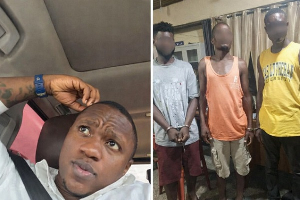Some Nigerians residing in Ghana's capital, Accra took to the streets early today, October 13, 2020, to join the ongoinging #EndSARS protest that has rocked several states in country and some cities across the globe.
The protesters who assembled at the forecourt of the Nigerian High Commission in Accra in their numbers were seen wielding placards with the now-famous inscription, #EndSARSNow.
Clad in customized T-shirt reflecting the purpose of the protest, some others were spotted with similar inscriptions: 'Stop Police Brutality', 'PMB Give Us Electricity, 'Nigerian Youth Will Not Be Silenced', 'Having A Laptop Is Not A Crime, #ENDSARSNow'.
Accra is the second city in the diaspora to join in a physical protest after London.
The protesters who were mostly students and entrepreneurs described the protest as a clarion call to the Buhari administration, noting that the voice of the youth is the loudest, hence it must be heard.
They indicated that the constant battery, theft, harassment, blatant extortion and in some cases, extra-judicial killings of young Nigerians by personnel of SARS have become unbearable. According to them, every youth in Nigeria has fallen prey to the infamous special unit.
They reckon that dissolving SARS will not bring the needed closure to the many families of victims of police brutality.
Meanwhile, to show solidarity in support of our neighboring country, some Ghanaian celebrities have taken to their social media pages to condemn the police brutalities.
According to Ghanaian actress, Lydia Forson, the current situation in Nigeria is a result of a buildup of suppression of Nigerians for so many years.
She wrote in a tweet: "Privilege will have you believing that what’s happening in Nigeria cannot happen in Ghana. Listen, Nigerians didn’t just wake up one day and decide to protest; this has been building up for many many years. And it’s not just about SARS either, people are just TIRED."
Privilege will have you believing that what’s happening in Nigeria cannot happen in Ghana.
— VOTE #lydiaforson #africansocialstar (@lydiaforson) October 12, 2020
Listen, Nigerians didn’t just wake up one day and decide to protest; this has been building up for many many years.
And it’s not just about SARS either, people are just TIRED.


















